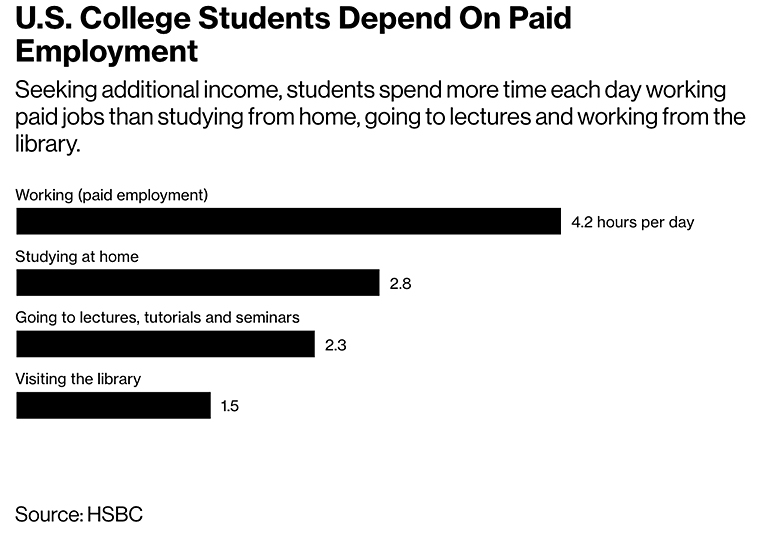U.S. students spend more time working paid jobs than going to class — from bloomberg.com by Riley Griffin
Facing mounting debt, U.S. college students spend double the time working paid jobs than in the library.
Excerpts:
Haunted by costly degrees and insurmountable student debt, American college students now spend more time working paid jobs than in lectures, the library or studying at home.
The vast majority of current students—85 percent—work while enrolled, according to an HSBC survey published Thursday. Students spend an average of 4.2 hours a day working paid jobs, which is more than double the time they spend in the library, nearly two hours more than they spend in class and 1.4 hours more time than they spend studying at home.
Haunted by costly degrees and insurmountable student debt, American college students now spend more time working paid jobs than in lectures, the library or studying at home.
The vast majority of current students—85 percent—work while enrolled, according to an HSBC survey published Thursday. Students spend an average of 4.2 hours a day working paid jobs, which is more than double the time they spend in the library, nearly two hours more than they spend in class and 1.4 hours more time than they spend studying at home.
“The economics of the debt crisis have become a major distraction to students’ education,” said John Hupalo, founder and chief executive officer of Invite Education, an education financial planner. “Students’ first priority should be to get value out of their education, not squeezing out hours at a job in order to make money to sustain that education.”

From DSC:
Obviously, this could be a major problem for many students — depending upon whether their work experiences are paying off in terms of other kinds of learning/experiences/skills development/obtaining jobs later on. But this need to work to get through school is also why I think online education needs to be more prevalent in higher ed. If students need to work to obtain a degree, then they need the flexibility to make their class schedules jibe with their work schedules. As with healthcare, I’d also like to see us find ways to bring the costs down.
Also see:
One HBCU Hopes Its ‘$10,000 Degree Pathway’ Will Win Over Students Considering For-Profit Alternatives — from edsurge.com by Jeff Young
Excerpt:
A public university in North Carolina has teamed up with six community colleges to offer a program that promises students they will pay no more than $10,000 out of pocket for their four-year degree.
Participating students will attend a two-year college in the state to get their Associate’s degree, then transfer to an online program at Fayetteville State University to finish their bachelor’s. The students will continue to have access to mentors and resources at the local community college to help them stay on track.
Making College Affordable Remains a High Priority in Washington — from campustechnology.com by Sara Friedman
More states are providing free college tuition, but equity concerns remain when it comes to the costs of textbooks, transportation and housing.








